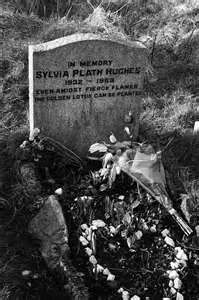Sylvia Plath’s journals detail, among other things, her love affair with words. She expresses great passion in her writing, yet also a grave sense that it does not yet measure up, that it is too self-absorbed.
What I have written here so far is rather poor, rather unsatisfactory. It is the product of an unimaginative girl, preoccupied with herself, and continually splashing about in the shallow waters of her own narrow psyche.
Plath, from an early age has a keen sense of what makes for great literature, yet like Van Gogh copying the masters in his early work, she sees herself lacking originality.
Do I create? No, I reproduce. I have no imagination. I am submerged in circling ego. I listen, God knows why. I say I am interested in people. Am I rationalizing?
At 19, she has much to learn, and she is aware of this.
Technically, I suppose the visual appearance and sound of words, taken alive, may be much like the mechanics of music… or the color and texture of a painting. However, uneducated as I am in this field, I can only guess and experiment.
At times, the young Plath’s lack of wisdom causes her great frustration. She desperately wants more time – an eternity – to learn all there is to know (in all realms of knowledge) so she can produce good writing. Occasionally, though, she hits on poetic expressions that bring her great joy. After writing a poem she entitled “Sonnet: To Spring”, she writes –
Luxuriating in the feel and music of the words. I chose and rechose, singling out the color, the assonance, the dissonance and musical effects I wished – lulling myself by supple “I”s and blend long “a”s and “o”s. God, I am happy – it’s the first thing I’ve written for a year that has tasted wholly good to my eyes, ears, and intellect.
Sylvia Plath would go on to write many poems, as well as the novel “The Bell Jar”, that would taste “wholly good” to the eyes, ears, and intellects of many people – in her own generation and for generations to come. Yet, she would not find ultimate satisfaction in this. Rather, she slipped into such despair that she opted to end her own life at the age of 30.
In many ways, this was an abrupt, tragic end to what was shaping up to be a brilliant literary career. In other ways, it was the culmination of a struggle that lasted over a decade. On November 3, 1951, Plath wrote in her journal –
God, if ever I have come close to waiting to commit suicide, it is now, with the groggy sleepless blood dragging through my veins, and the air thick and gray with rain and the damn little men across the street pounding in the roof with picks and axes and chisels, and the acrid hellish stench of tar.
Yet, it was not the unpleasantness around her that caused her the most trouble, but the unsettledness within.
I am afraid. I am not solid, but hollow. I feel behind my eyes a numb, paralyzed cavern, a pit of hell, a mimicking nothingness. I never thought, I never wrote, I never suffered. I want to kill myself, to escape from responsibility, to crawl back abjectly into the womb.

sylvia-plath-grave from Dawn Pisturino in Belles-Lettres
Quotes from The Unabridged Journals of Sylvia Plath
for more reflections on Plath’s journals, see –
One cannot help but wonder what other poems and novels she might have produced had she lived a longer life. Then again, who knows? Perhaps her suicide was fulfilling some sort of ancient pact. We can’t always understand what’s going on behind the scenes. As they say, “Only the Shadow knows . . .”
It is truly sad.
I knew very little about Sylvia Plath before I started reading your blog. Now it makes me hungry for more. “The Bell Jar” is on my reading list this summer. Thank you.
You are most welcome.
Thank you for reading, and commenting.
Thanks Tony, I’ve enjoyed reading your series on Plath. The quality of her writing and the degree of self-awareness revealed by her journal at 19 is astonishing. There are great minds like that, and it’s humbling to read of them.
Humbling it is.
Thanks for the comment.